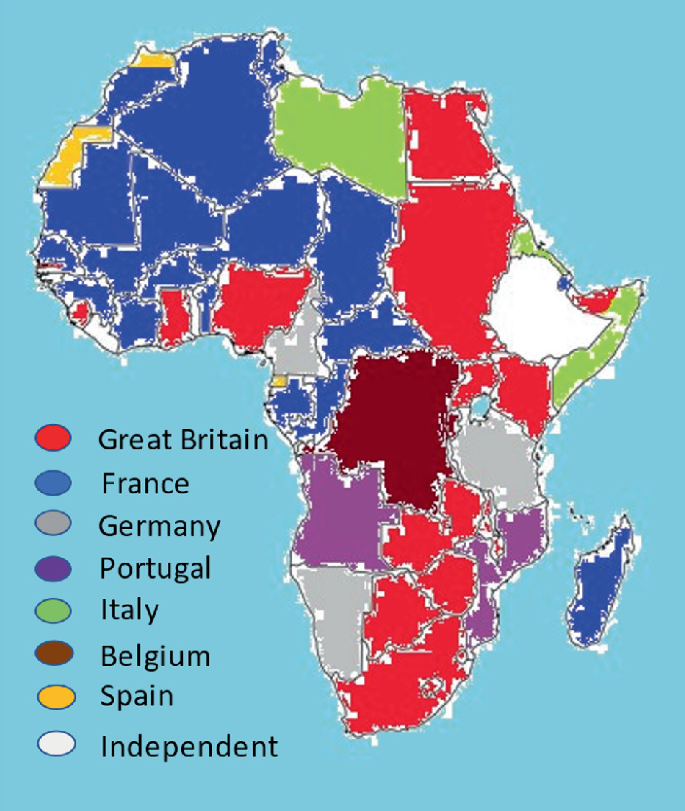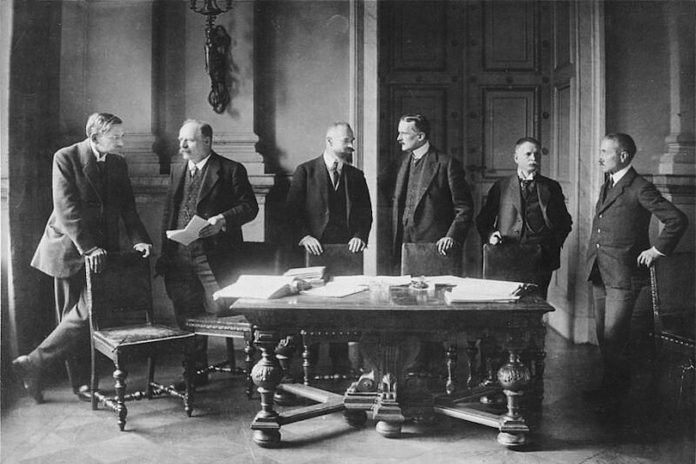“The institution of diplomacy is as old as history itself. Oppenheim in his treatise of International Law has stated ‘Legation as an institution for the purpose of negotiating between different states is as old as histories whose records are full of examples of legations sent and received by the oldest nations.’ History records that in the earliest period, special missions were being exchanged between Greek City States and by the Fifth Century BC such special missions had become so frequent that something approaching our own system of regular diplomatic inter-course seemed to have been achieved’1.
Diplomacy is as old as civilization itself, it is defined as the ‘peaceful dialogue and interaction between two political units.’ In known history the first peace treaty was signed about 2300 BC between the King of Elba (Syria) and the King of Assyria. The ‘Amarna Tablet’ records the diplomatic correspondence between Egypt and Syrian Rulers more than 1400 years ago, while Genesis 14 talks of Abram’s ‘Treaty of Alliance’ with Amorite King. From eight to the third century BC, China was divided among several ‘warring states’ that carried out diplomacy at its peak for its survival and success.
Historical evidence reveals that after the breakup of Alexander’s Empire, the new emerging States maintained relations among themselves through diplomacy. During the Kingship of Indian Emperor Ashoka exchange of envoys with other countries was relatively frequent. To restore diplomatic relations King Ashoka sent emissaries to distant lands like Syria, Egypt, Macedonia, Epirus, and Cyrine, and by 7th Century AD, later, the Indian Emperor succeeded in preserving these relations. China was than the oldest of the civilization dating back to 5000 BC, hence, like others, Ashoka sent envoys to China as well. Other kingdoms in South and South East Asia continued contacts with China through their envoys and the Emperors of Sumatra and Java (present Indonesia), the King of Ceylon, as early as in the 4th Century AD sent their respective emissaries to India for facilitating Buddhist pilgrims.
In West Asia (mostly constitutes the Arab lands at that time) from the time of Prophet Mohammad (PBUH), messengers were sent abroad for religious and political purposes, Muslim records disclosed that the Prophet (PBUH) himself sent envoys and messengers to Byzantium, Egypt, Persia and Ethiopia. The primary functions of these envoys were related to limited specific missions such as negotiations or signing of peace treaties or exchange of prisoners of war and not promoting diplomatic relations or maintaining them. However, during Abbasid’s reign the policy of peaceful and friendly relations of Muslims with other nations restored and the requirements of International trade bridged the diplomacy.
In Europe the origin of diplomacy synchronized with the break-up of Roman Empire. The diplomatic relation and exchange of envoys has been established long time back, though, in absence of permanent diplomatic missions as of today. By 15th century the European princes usually sent temporary diplomatic missions to other countries later terminate them, with the accomplishment of the particular mission or task.
The Italian republics were the first to introduced permanent diplomatic missions at each others’ capitals understanding its benefits. According to famous jurist Fauchille, the history of diplomacy falls into two clear distinct periods. First, the period of non-permanent ad hoc missions covering antiquity and the Middle Ages ending in the 15th century. Secondly, the period of permanent legations originated in Italy and later expanded throughout Europe.2
The origins of modern diplomacy could be traced in Europe with the creation of modern, geographically sovereign states such as the formation of Westphalian state after the ‘Peace of Westphalia’ in 1648. The new international system thus formed required revised diplomatic norms to fulfill its needs and consonant.
With the breakdown of the old structure of European International order, modern, geographically sovereign states began to emerge in Europe. The old international system or diplomatic practices were different from our contemporary international system. ‘There were structures that existed above and beyond today’s nation state were called supra-statal and structure existing below within today’s nation-state was called infra-statal.’3
The supreme supra-statal institutions were the Papacy and the Holy Roman Empire both were ingrained in the spiritual domain and reflecting the glory of the ancient Roman Empire. Popes and Emperors were claimed to be the heirs of the Roman Entity. The two institutions of clergy and nobility enjoy most power over their rulers and subjects respectively. While the clergy was only answerable to ‘God’ and no human spirit can challenge or argue their authority.
The primary infra-statal institutions were a baffling mixture of thousands of autonomous jurisdictions, starting from the Kingdoms like England, France and Aragon and trickling down a long hierarchical chain of political organizations, through principalities, duchies, free counties, etc. and to corporate bodies like guilds, military orders, and religious orders. All of them exercised political power in some way or the other. The jurisdiction, rights, powers, and responsibilities of both the supra-statal and infra statal institutions, hence, became conflicting and were just repetitions of statutes.
These supra-national and infra-national institutions constitute and defined as Christendom. Christendom’s institutes acquire strength and legitimization from feudal traditional practices mixed with public office and public functions with private property and hereditary rights, from religious and spiritual sanctions to social and cultural habits i.e. a thousand years in the making. Political order, hence, formed in the Christendom was reflected by interlocking networks of rights and responsibilities, fragmented into small and autonomous divisions.
The launch of national consciousness supported the process of the development for the new political units and with the growth of dialectical languages they became equal sovereign states. This process of state formation supersedes the old supra-national institutions and the old infra-national institutions.4
The face of the European states was changed by the commotion of Renaissance, the Reformation and the Industrial Revolution. As an ultimate reaction the relations and contacts between various nations in Europe boosted, needed for finding markets for the expanding industry while making permanent representation almost indispensable.
Modern diplomacy is not older than 400 years though the objectives and functions of the institutions remain consistent, primarily protecting the development and wellbeing of the States. A diplomat’s duty in the expanding sphere of international activity would be derived from his responsibility as ‘charge of official relations between his home State and State to which he is accredited.’5

While discussing economic diplomacy, the struggle for markets led to competition and acquisition of royal favor for better access and facilitations. The colonial powers waged wars against each other for annexation of territories in Asia, Africa and elsewhere. The struggle for respective assurance of markets, for their finished goods and collection of raw materials to accomplish the needs of their expanding colonial economy led to further conflicts between them. By the end of 18th century, the seven colonial powers of Britain, France, Portugal, Netherlands, Germany, Spain and Belgium annexed and captured more than two-third of the entire region and divided it amongst themselves. The smaller territories not formally annexed, to obtain shelter and avoid any unanticipated eventuality, came under the domination of one or more colonial powers. During this period, the functions of diplomatic envoys were basically the same as in the pre-colonial era because the foreign policy had to be oriented with reference to rivalries flanked by the colonial powers themselves.
With the passage of time diplomacy nurtured with expanding horizons and distinguished diplomats were being sent on special missions to some of the eastern courts for securing concessions regarding trade and settling trading zones of their choices. Such that one colonial rival for securing better concessions than their rivals asking for concessions to get maximum hold in others home state which in due course derived conflicts amongst them.
Diplomacy had been reoriented to congregate the challenges of European politics in its changed context by the end of 18th century. Accordingly, the French revolution, the Napoleonic wars, the unification of Germany, the role of leading statesman like Ottovon Bismarck and Klemens von Metternich in the spheres of the European politics have changed the nucleus of the contemporary Europe by strengthening the institution of diplomacy. The French Revolution had far reaching impact for changing mindset of the common man in Europe while shivering the super-structure of the absolute monarchies. The envoys were then compelled to feel the pulse of the nation while understanding the common man at the designated assignment. The task of the Ambassador was described more than usual, in his briefing or reporting back to his home country he was assigned to inform the feeling of the common man, stability of the government, economy, politics, human rights and above all the feelings of the common man towards his home country. The feedback helps in formulating policies for specific countries, hence, varies country to country, unlike past it is more on the assessment of the ambassador designate than the wishes and whim of the Monarch. As a result of which the embassies and legations naturally grew in size and a certain degree of professionalism was introduced in the diplomatic skills.6
This was one of the reasons that historians have blamed the diplomats and not specifically the government for the two world wars, characterized as one of the perceptible failure of diplomacy. The diplomats of the great powers failed to inform their respective governments about the fermented situation which could perhaps have been checked and avoided by timely action.
On the contrary, diplomatic activity in the Middle East and Africa has other perspectives. In the territories which had formed part of the Ottoman Empire feuds were fomented among local rulers or tribal chiefs which empowered one or more of the colonial power to keep their foothold in the area and obtain concessions for their nationals or national companies with regard to mineral resources.7
The Second World War left deep scars on the face of the world politics and diplomacy. The immeasurable amount of destruction brought the world powers to sit together forming an alliance in the name of United Nations Charter to address the grievances of the nations destroyed, though the new arrangements has its own fallouts. It is not far from reality to assume and identify the structure and formation of the foreign policies at that time. It was primarily based on the post-cold war era and the prevailing situation.
The Western European countries then focused on establishing and strengthening their relations with each other based on common principle of mutual benefit in defense, customs union, economic cooperation, abolition of visas, etc., which led them to formation of the ‘Council of Europe.’ Simultaneously, the United States of America abolished its traditional strategy of isolation and became an active member in European affairs by forming huge defense alliances and facilitating massive aid for economic recovery in Western Europe.
In conclusion, diplomacy has gone through many phases and procedures of development to arrive at its present state. It has verily become the cornerstone in the structure of the new international legal order. In fact, the ideals of the United Nations charter are to be translated into practice if the succeeding generations are to be saved the scourge of war, it is thus the policies and practice of nations, their diplomacy and fact which can contribute towards it. It is in the fulfillment of this task that the countries of the world have an ever increasing role to play.8 It is therefore, the responsibility of the states to either use this institution for progress and prosperity or to blend into wars and destruction. Diplomacy should be free of political practices and appointments should me made on merit rather on favoritism or rewards. A true diplomat is in fact, a jewel in any state’s crown.
End Notes
1B. Se n, ‘Diplomacy in the Historical Perspective and The Third World,’ The Turkish Yearbook, p. 73, 1976 http://www.politics.ankara.edu.tr/dergi/tybook/16/DIPLOMACY-IN-THE-HISTORICAL-PERSPECTIVE-AND-THE-THIRD-WORLD.pdf
2Op. cit. p. 74
3Louis J. Nigro, Jr., ‘Theory and Practice of Modern Diplomacy: Origins and Development to 1914,’ Chapter 14, p.195
4Ibid.
5B. Sen, Op. cit. p. 75
6Ibid. p. 79
7Ibid. p. 83
8Ibid




